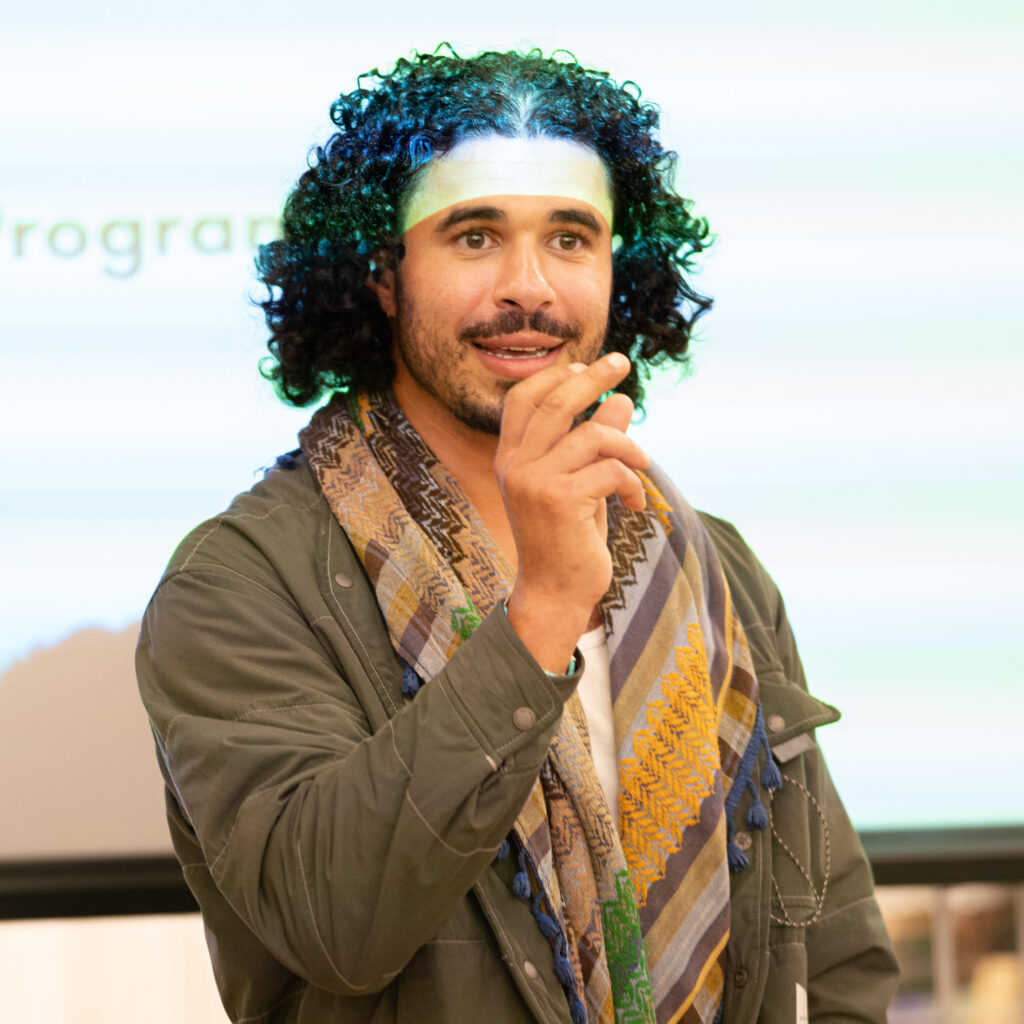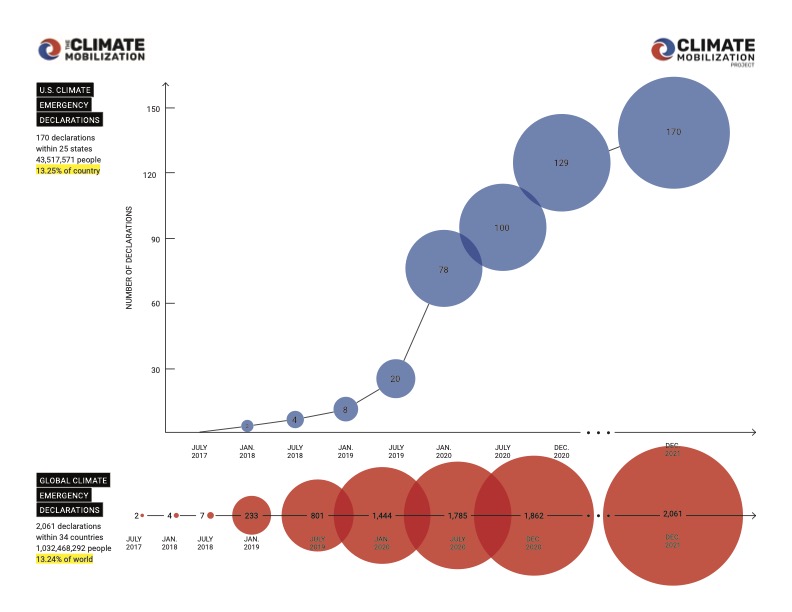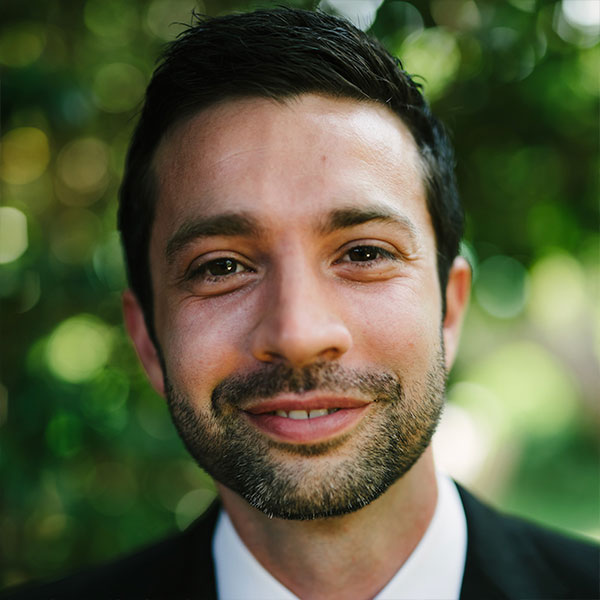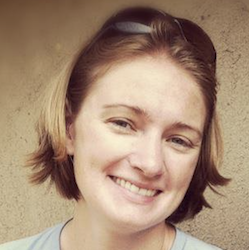*Photo by Tina Hartung on Unsplash
Climate Mobilization News
The situation in the Ukraine continues to escalate and the climate implications cannot be understated. We have dedicated a whole section of this newsletter to talk about it in depth below.
We are thrilled to be one of ten finalists for The American Climate Leadership Award! Join us for ecoAmerica’s 2022 American Climate Leadership Summit on March 28 and find out if we win the $50,000 grand prize! Register here.
We are also excited to welcome our new Climate Mobilization Network members: Extinction Rebellion Houston, Houston TX; Fridays for Future, Los Angeles; Indigenous People of the Coastal Bend, Corpus Christi, Texas; NC WARN, Durham, NC; and Youth Emergency Auxiliary Service Sierra Leone, East Sierra Leone.
The Climate Mobilization Network is a learning community of organizers from across the US that is sharing skills and connections, and receiving coaching and mentoring. If you are part of a group that is interested in joining the network, get in touch with us here.
Please join us for the March 30 Network meeting, featuring a presentation and Q&A with Anna Siegel – a youth activist and lead organizer from Maine Youth for Climate Justice (MYCJ). Anna will share how MYCJ is navigating financial opportunities and challenges for implementing climate emergency policy – including current federal funding opportunities and state-to-municipal funding channels. TCM policy expert Zack Burley will share an analysis of funding sources available for implementing climate policies that create regenerative local economies. You can sign up here.
Stop the Money pipeline is giving those of us who bank with Chase, Citibank, Wells Fargo and Bank of America the opportunity to send a letter to bank leaders, demanding that they stop funding fossil fuels and deforestation. Since the Paris Agreement was signed, Wall Street banks have loaned nearly $1.2 trillion to the fossil fuel industry ― money that is used to build new coal mines and oil pipelines. But customers of these banks are beginning to catch on. Since September, nearly 10,000 customers of Chase, Citibank, Wells Fargo and Bank of America have joined the Customers for Climate Justice campaign and signed on to open letters to the CEOs of their banks. Customers have a special leverage to demand that their bank does better. Click here to send a letter!
Climate Mobilization Project is thrilled to be joining Power Shift Network, a national community of organizations who work with young leaders to fight for climate justice. Power Shift is leading network weaving that centers BIPOC-led climate movements, and we are so excited to be collaborating with and expanding our partnership work with them moving forward.
Team Spotlight
Meet Mariyah Jahangiri, our Network Organizer.
Mariyah leads Climate Mobilization Network’s recruitment, coordination, and organizing support. She has organized across movements and is passionate about addressing white supremacy in the mainstream climate movement and building capacity for youth-led, BIPOC-led intersectional climate movements. She has been inspired by her experiences organizing to defund the police in Boston, supporting mutual aid and food sovereignty projects in Iowa, Atlanta, and Puerto Rico, and working on a Make Big Polluters Pay campaign. Mariyah worked as an organizer with the Bernie Sanders 2020 campaign and Planned Parenthood PAC. She graduated from Grinnell College with a Sociology degree.
Ukraine Invasion
We want to share a few words about the escalating situation in the Ukraine:
Let us state first and foremost that we are devastated by this war and mourn with the rest of the world as we are forced to watch a country destroyed by the greed of another country’s leaders. It is not a reach to say that the same power-hoarding that has led to this political crisis drives the climate crisis. And with that in mind we want to note that among the humanitarian, refugee, and geopolitical consequences the world is grappling with, the climate implications (both risks and opportunities) are gargantuan and cannot be overstated.
For example, Germany canceled the NordStream 2 fossil gas line with Russia immediately after the invasion started, and has since declared a commitment to 100% renewable energy by 2035 – but that’s just the tip of the iceberg. Bill McKibbon wrote a “Heat Pumps for Peace” article, which has since made its way to White House discussions, detailing how the U.S. can support the people of Ukraine and further energy security goals by rapidly decarbonizing and eliminating reliance on petro-state dictators. Over 200 organizations, including TCM, have once again called with invigorated energy on Biden to declare a climate emergency and utilize the Defense Production Act to rapidly transition away from fossil fuels. Again we can clearly see that tackling the climate crisis means tackling all that it is interconnected with, including fascism.
But the conflict has also brought old bigotries to the surface — there are no shortage of examples of selective treatment of refugees from a “European” conflict, as opposed to refugees from many other parts of the world. And even within that selective treatment, African refugees from the same country are being denied the right to evacuate. To put it plainly, a Just Transition is not possible while people of color are treated as less worthy of compassion than white people. Whether a refugee comes from Ukraine, from Afghanistan, or from a California fire zone — everyone will need to commit to each other’s humanity because the crisis threatens all of us.
There’s another character in this story that must be named: Oil and gas corporations. For decades, these fossil fuel companies have undermined America’s security and enabled petrostate dictators like Putin, but also facilitated atrocities of similar regimes like Saudi Arabia and the ongoing bombing campaigns in Yemen. Although American oil majors like Exxon have pulled out of the Gazprom project in Russia, they continue to use war to lobby for more fossil fuel reliance, more drilling, and currently are price gouging and profiting off the conflict. It is a good step to see some members of Congress call for a windfall profits tax on oil and gas — the fight against these agents of inhumanity has entered a new stage, and we can all do our part by joining the climate movement and making sure nobody ever needs their product ever again.
Learning opportunity
Checkout part three of “Hoodwinked in the Hot House,” a webinar co-hosted and organized by Hoodwinked Collaborative and The New School, focusing on making sure that federal and state funds meant to fight climate change are not taken by corporations offering false solutions. Along with debunking false solutions, this webinar will highlight inspiring stories of success led by environmental justice communities.
This panel was preceded by Hoodwinked in the Hothouse I: Examining False Corporate Schemes being advanced through the Paris Agreement, and by Hoodwinked in the Hothouse Part II: Frontline Voices of Indigenous Resistance beyond Climate False Solutions. The recording of these events is available here and here.
Support this work
Can you pitch in to invest in this critical work? Every donation helps speed up the transition we need towards climate justice at emergency speed. Thank you for being a part of this movement!

















